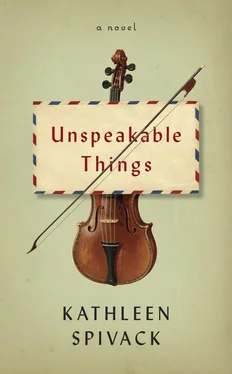When the doors opened, those who had managed to get tickets ahead of time filed in, still seething with hatred. There was the annoyance of chairs clapping open, an epidemic of coughing and throat clearing, and crutches thrown down, clanking on the people in the seats in front. Young people wound wool scarves more securely around their necks, just waiting for the next provocation. As they hefted themselves into the front rows of seats at the last minute, there was the annoying swish of fur coats and silk stockings.
Finally, the first violinist sounded the open A string, which started a round of intense tuning and a last desperate spate of coughing. Then, chins firmly pressed, they drew their bows.
The Tolstoi Quartet played so exquisitely, so at one with each other and with their instruments, that to hear them was to be instantly transformed. The audience breathed in time to the musicians, who breathed in time to their musical instruments. Sore throats were instantly healed, and lung diseases, to which Austrians and Germans seemed particularly susceptible, went into partial remission. Coughing stopped, and the effect lasted for several days. Crutches were forgotten. Arthritics found they could unfold themselves and walk freely out of the concert hall. All discomfort vanished at the soft sounds of bows caressing strings. To listen to them was to be blessed with a sharper vision, to walk out into a world of bright colors and tenderness and an inner softening that took all hurt, all discord away. Even the angry throng outside the theater was calmed by the strains of the music that floated out.
Individually, the men were remarkable musicians, but since they always played together, they breathed as a single unit, not one instrument standing out, no one pushing to be heard. The instruments swooned in their arms and the harmonics vibrated through the hall. The musicians adjusted their breathing, and healing entered their lungs. They were filled by the music: music they knew, music large enough to blot out everything else that was happening in Vienna.
Meanwhile, many of their private subscribers and patrons, including the Hofrats, were disappearing from Vienna. Most of Herbert’s relatives were shipped to the camps, including his sister and brother and their entire families. This was never spoken of.
Now Furtwängler, who was himself in danger of being sent to a concentration camp, and who had a very ambivalent relationship with the Third Reich, was sent to Vienna to oversee all musical lack of discipline. He realized that the members of the Tolstoi Quartet, stupid or not, needed some indoctrination, as well as protection, if they were to remain a staple of the Viennese musical appetite. They were to join the Party, as all remaining state musicians were required to do. He summoned them to state offices in the company of the newly appointed Nazi Minister of Propaganda.
The players blinked their eyes, as they rarely went out in daytime. They shuffled their feet, caressing their instruments. “Heil Hitler.” The players held up their bows in their right hands and waved them, a feeble protest.
“You are obliged,” Furtwängler said, “to rename your quartet in a more acceptable way. A more German way. For instance, we suggest the Goebbels Quartet, after our noble minister.”
“Never!” the musicians cried with one voice, and their stringed instruments protested so loudly and discordantly that Goebbels, the new Nazi Minister of Propaganda, had to block his ears and run out into the hall. “Think about it.” Furtwängler said, fixing them with a menacing glare. “We are warning you.”
The Minister of Propaganda wanted the Quartet deported at once, but Furtwängler intervened. Already European music was being depleted. These feeble men were one of the last links to Vienna’s glorious past. “Wait,” he counseled Goebbels. “Let’s give them one more year and see if they come around. If not, they will disappear. I will guarantee it.” They saluted each other smartly.
By the end of the year, the disgraced Tolstoi Quartet was forced to leave Austria. It was too late in the war for Furtwängler to consider a steamboat such as the SS Koenigstein, one of the last passenger boats to leave Germany. Ports in South America were now closed. Under Furtwängler’s intervention — and money — the Tolstoi Quartet was sent to Bremerhaven, where they were smuggled onto a submarine. There they were flattened and pressed, fitted neatly behind one of the smaller turbines. With its dubious freight, the U-boat Eva serpentined toward the Americas, its long black snout snacking and feeding on the fire, chaos, and wreckage it created along its way.
The German submarines plied the waters off the Atlantic coast of the Americas, which allowed them to torpedo at will. They still owned the Caribbean waters and especially the sympathetic shores of South America, where they could refuel and restock. They were bottom-feeders, and on their way they fed off the tankers carrying crude oil from Venezuela to Aruba to New York, as well as off the ships ferrying sugar from Cuba, guns, supplies. The convoys of liberty ships were fair game. The ships carried men and weapons to Europe to fuel the Allied war effort, and the returning convoys carried caskets, corpses, and war brides, the remains of war. Anything could be had for a price, and the waters off the Americas seethed with the ever-hungry torpedoes.
Coming up for air along the coast of Venezuela, the U-boat Eva suddenly surfaced. Its menacing turret poked out, took in the blue sky and bright air, inhaled a breath, and vomited just once before it sank again, leaving a half-mile sheen of its own ambergris. Among the assorted debris were Zwieback crusts and pigs’ carcasses, potato peels, a corpse or two, and human waste. The Tolstoi musicians were also swept along on a child’s rubber raft provided for the purpose.
Released onto the ocean, all blinding brightness, all sudden sunshine, the members of Tolstoi Quartet clung to their instrument cases and whimpered. Along with all other war wreckage, they were swept in to shore on the incoming tide near La Guaira, the Venezuelan port that served Caracas, there to await a ship that would smuggle them somewhere else.
In port, as prearranged, the tramp steamer Calypso awaited them. The Calypso was slowly getting ready to load. Captain Joe Riley buttoned his trousers as he sauntered out of the doorway, whistling. It was late morning, and he had just left Carmelita, his favorite girl, the one-legged whore of La Guaira. It had been a totally satisfying session; she had given him the best part of the night, and strong coffee and pastry just before he left. He planned to go back to her again that afternoon before his ship left port. Behind him, in line waiting for Carmelita, who was sleeping it off now and would be in no hurry to accommodate them, were his officers, as well as assorted officers and crew members of other merchant ships in port. Joe passed them by, his voracious parrot, Sugar, cackling and fretting on his shoulder as always. A huge but rather cowardly bird, she plumped her feathers up and made a fierce face at the waiting men.
Carmelita was the most popular and, to Joe, the prettiest of the girls in all of South America, or so it was rumored. She was known all over the ports and throughout the ships. Men were fascinated by that one-legged whore and her stump. They just couldn’t stop themselves from caressing it. Carmelita was also a talented contortionist. She could put more love into a man than any other girl on the coast. She found places to arouse that they never even knew they had. One night spent with her, and she got into men’s minds: they could never stop dreaming or talking about her afterward. They groaned and muttered her name in their sleep. She was the most depraved woman most of the men had ever known, wild and legendary in her endless inventiveness and pleasuring. She left them wanting more, always more.
Читать дальше












